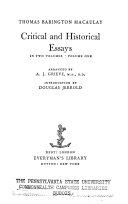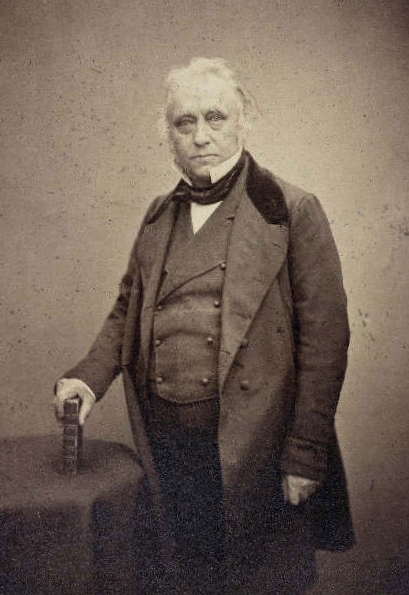Horatius, st. 26 & 27; this quote is often truncated to read:
Lays of Ancient Rome (1842)
Context: Then out spake brave Horatius,
The Captain of the Gate:
"To every man upon this earth
Death cometh soon or late.
And how can man die better
Than facing fearful odds,
For the ashes of his fathers,
And the temples of his gods, And for the tender mother
Who dandled him to rest,
And for the wife who nurses
His baby at her breast,
And for the holy maidens
Who feed the eternal flame,
To save them from false Sextus
That wrought the deed of shame?"
Works
Lays of Ancient Rome
Thomas Babington Macaulay, 1st Baron Macaulay
Critical and Historical Essays
Thomas Babington Macaulay, 1st Baron MacaulayFamous Thomas Babington Macaulay, 1st Baron Macaulay Quotes
“The gallery in which the reporters sit has become a fourth estate of the realm.”
On Hallam's Constitutional History (1828)
Thomas Babington Macaulay, 1st Baron Macaulay Quotes about men
On Boswell’s Life of Johnson (1831)
http://www.columbia.edu/itc/mealac/pritchett/00generallinks/macaulay/txt_commons_indiagovt_1833.html#13
Attributed
“Men are never so likely to settle a question rightly as when they discuss it freely.”
Southey's Colloquies on Society (1830)
Speech http://www.bartleby.com/349/authors/133.html to the electors at Edinburgh (May 1839)
Thomas Babington Macaulay, 1st Baron Macaulay: Trending quotes
Horatius, st. 32 & 33
Lays of Ancient Rome (1842)
Context: p>Then none was for a party,
Then all were for the state;
Then the rich man helped the poor,
And the poor man loved the great;
Then lands were fairly portioned,
Then spoils were fairly sold;
The Romans were like brothers
In the brave days of old.Now Roman is to Roman
More hateful than a foe;
And the Tribunes beard the high
and the fathers grind the low;
As we wax hot in faction,
In battle we wax cold;
And men fight not as they fought
In the brave days of old.</p
Horatius, st. 70
Lays of Ancient Rome (1842)
Context: When the goodman mends his armor,
And trims his helmet's plume;
When the goodwife's shuttle merrily
Goes flashing through the loom;
With weeping and with laughter
Still is the story told,
How well Horatius kept the bridge
In the brave days of old.
Thomas Babington Macaulay, 1st Baron Macaulay Quotes
Vol. I, ch. 1
History of England (1849–1861)
Horatius, st. 50
Lays of Ancient Rome (1842)
“The great cause of revolutions is this, that while nations move onward, constitutions stand still.”
Speech on Parliamentary Reform. http://www.gutenberg.org/etext/2170 (1831)
“The highest proof of virtue is to possess boundless power without abusing it.”
Review of Aiken’s Life of Addison (1843)
According to Kenneth Owen Morgan (The Illustrated History of Britain (1984) p. 421) this was said by Macaulay in 1832. If so, he was quoting a letter written by Edmund Burke in 1777.
Attributed
' History https://www.gutenberg.org/files/55901/55901-h/55901-h.htm', Edinburgh Review (May 1828)
Speech on the Copyright Bill (5 February 1841)
Southey's Colloquies on Society (1830)
“The object of oratory alone is not truth, but persuasion.”
On the Athenian Orators http://books.google.com/books?id=qb0OAAAAYAAJ&q="The+object+of+oratory+alone+is+not+truth+but+persuasion"&pg=PA135#v=onepage (August 1824)
“There you [Sir Robert Peel] sit, doing penance for the disingenuousness of years.”
Speech in the House of Commons (14 April 1845)
On Hallam's Constitutional History
This quotation is commonly said to have been spoken by Macaulay during a speech to the British Parliament in 1835. Since Macaulay was in India at the time, it is more likely to have come from his Minute on Indian Education http://www.columbia.edu/itc/mealac/pritchett/00generallinks/macaulay/txt_minute_education_1835.html. However, these words do not appear in that text. According to Koenraad Elst http://koenraadelst.bharatvani.org/articles/hinduism/macaulay.html, these words were printed in The Awakening Ray, Vol. 4, No. 5, published by the Gnostic Center, preceded by: "His words were to the effect." Burjor Avari cites this misattribution as an example of "tampering with historical evidence" in India: The Ancient Past ISBN 9780415356169, pp. 19–20), writes: "No proof of this statement has been found in any of the volumes containing the writings and speeches of Macaulay. In a journal in which the extract appeared, the writer did not reproduce the exact wording of the Minutes, but merely paraphrased them, using the qualifying phrase: ‘His words were to the effect.:’ This is extremely mischievous, as numerous interpretations can be drawn from the Minutes." For a full discussion, see Koenraad Elst, The Argumentative Hindu (2012) Chapter 3
Misattributed
“He [Richard Steele] was a rake among scholars, and a scholar among rakes.”
Review of Aiken’s Life of Addison
Vol. I, ch. 3
History of England (1849–1861)
Source: Horatius, st. 1, Lays of Ancient Rome (1842)
Southey's Colloquies on Society (1830)
' History https://www.gutenberg.org/files/55901/55901-h/55901-h.htm', Edinburgh Review (May 1828)
"Lord Bacon", (1837) in Essays 2:183
Attributed
On Moore’s Life of Lord Byron (1830)
Diary entry (9 March 1850)
On Ranke's History of the Popes (1840)
“A single breaker may recede; but the tide is evidently coming in.”
Southey's Colloquies on Society (1830)
On Moore’s Life of Lord Byron (1830)
On Fredrick the Great (1842)
Essay on Mitford's History of Greece (1824)
On Warren Hastings (1841)
Ivry: A Song of the Huguenots http://www.bartleby.com/246/76.html, l. 29 (1824)
http://www.columbia.edu/itc/mealac/pritchett/00generallinks/macaulay/txt_commons_indiagovt_1833.html#13
Attributed
Horatius, st. 59
Lays of Ancient Rome (1842)
“The measure of a man's real character is what he would do if he knew he would never be found out.”
citation needed
The earliest quotations of this give it as anonymous or unknown author. https://books.google.com/books?id=hPIsAAAAYAAJ&pg=PA321&dq=%22what+he+would+do+if+he+knew+it+would+never+be+found+out%22&hl=en&sa=X&ved=0CBwQ6AEwAGoVChMIlvi0prz_xwIVTwaSCh0hVwX5#v=onepage&q=%22what%20he%20would%20do%20if%20he%20knew%20it%20would%20never%20be%20found%20out%22&f=false https://books.google.com/books?id=i2MPAQAAIAAJ&pg=PA16-IA71&dq=%22what+he+would+do+if+he+knew+it+would+never+be+found+out%22&hl=en&sa=X&ved=0CB0Q6AEwAGoVChMIkMmp8rz_xwIV1BGSCh25lAO0#v=onepage&q=%22what%20he%20would%20do%20if%20he%20knew%20it%20would%20never%20be%20found%20out%22&f=false
Attributed
“These be the great Twin Brethren
To whom the Dorians pray.”
The Battle of Lake Regillus; reported in Bartlett's Familiar Quotations, 10th ed. (1919)
On John Dryden (1828)
Letter written to his father in 1836. Quoted in Indian Church History Review, December 1973, p. 187. Quoted from Goel, S. R. (2016). History of Hindu-Christian encounters, AD 304 to 1996. Chapter 13. ISBN 9788185990354
On Machiavelli http://www.bartleby.com/27/24.html (1827)
